Do you know that 1 in 33 babies worldwide are born with some form of birth defect? Learn how pediatric specialties can help diagnose and treat these conditions to give your child a better chance of a healthy life.
Some medical conditions affecting children can be complex and require specialized knowledge and approaches for diagnosis and treatment. Paediatric specialties offer the expertise needed to manage these complex conditions effectively, providing comprehensive and specialized care for young patients.
Pediatric specialties emphasize early detection and intervention for childhood diseases and conditions, promoting better long-term health outcomes and reducing potential complications in adulthood.
Pediatricians are medical doctors who specialize in the care of infants, children, adolescents, and young adults. They focus on promoting and maintaining the physical, emotional, and social health of young patients up to the age of 21. Pediatricians provide general medical care and are often considered primary care providers for children.
However, within the field of pediatrics, there are various specialties that pediatricians can further specialize in. These specialties allow pediatricians to develop expertise in specific areas of pediatric care, catering to the specific needs of young patients.
7 Types of Pediatric Specialities
1. Paediatric cardiology:
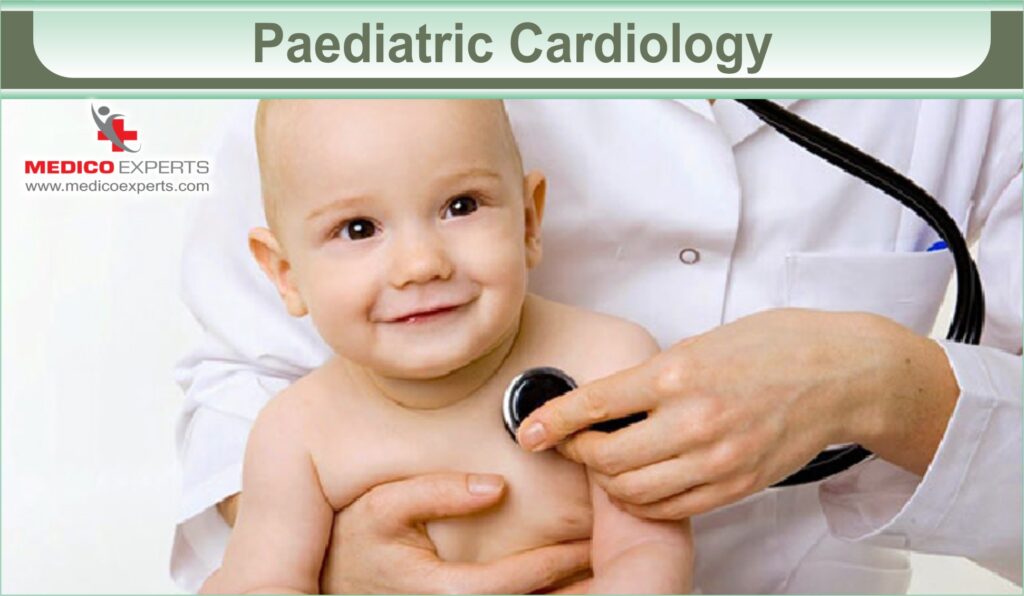
Paediatric cardiology is a specialized branch of cardiology that focuses on the diagnosis and treatment of heart problems in children, from birth through adolescence.
It deals with congenital heart diseases (heart conditions present from birth) as well as acquired heart diseases that may develop later in childhood.
Some common conditions that pediatric cardiologists diagnose and treat include:
- Congenital heart defects: These are structural abnormalities of the heart and blood vessels present at birth, such as atrial septal defects, ventricular septal defects, or Tetralogy of Fallot.
- Arrhythmias: Irregular heart rhythms, including bradycardia (slow heart rate) or tachycardia (fast heart rate), that can affect the normal functioning of the heart.
- Cardiomyopathies: Diseases that affect the heart muscle, leading to weakened pumping function.
- Acquired heart diseases: Conditions that develop later in childhood, such as rheumatic heart disease.
- Murmurs: Abnormal heart sounds that may indicate an underlying heart problem.
MedicoExperts team of pediatric cardiologists helps you take care of your child’s heart problem with utmost care.
2. Paediatric Endocrinology:
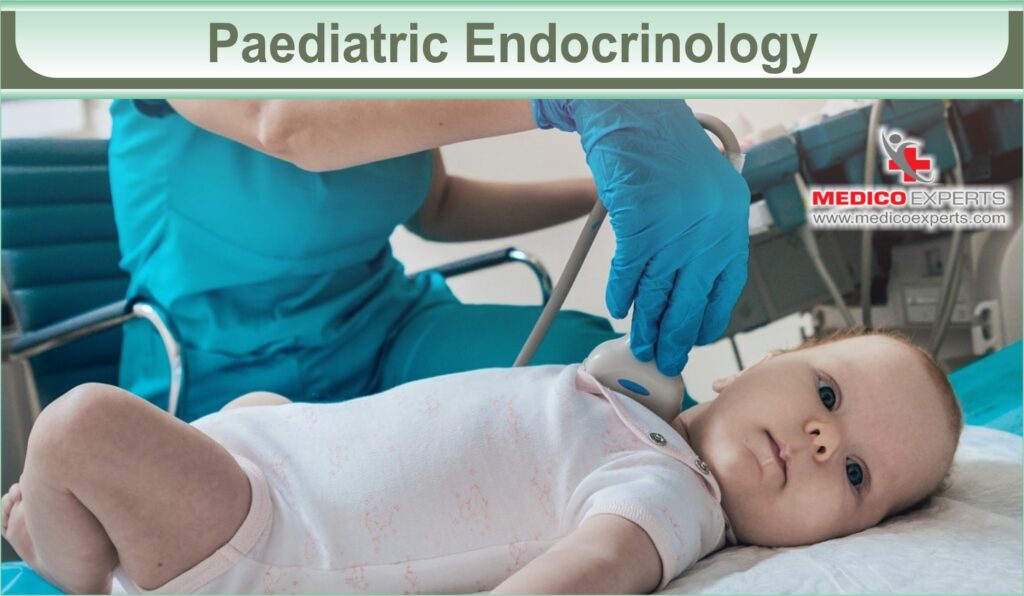
Paediatric endocrinology is a medical subspecialty that focuses on the diagnosis and treatment of hormone disorders in children and adolescents. Endocrine disorders involve issues with the endocrine system, which is responsible for producing and regulating hormones in the body.
Paediatric endocrinologists have specialized training and expertise in dealing with these disorders in young patients.
Some common conditions that paediatric endocrinologists diagnose and treat include:
- Growth disorders: This includes conditions such as short stature (slow growth), tall stature (excessive growth), and growth hormone deficiency.
- Puberty disorders: Paediatric endocrinologists diagnose and manage conditions like precocious puberty (early onset of puberty) or delayed puberty (late onset of puberty).
- Thyroid disorders: These include conditions like hypothyroidism (underactive thyroid) and hyperthyroidism (overactive thyroid).
- Adrenal disorders: Paediatric endocrinologists evaluate and treat disorders of the adrenal glands, such as congenital adrenal hyperplasia or adrenal insufficiency.
- Diabetes: They manage type 1 and type 2 diabetes in children and adolescents, including specialized insulin therapy and diabetes education.
3. Paediatric Gastroenterology:
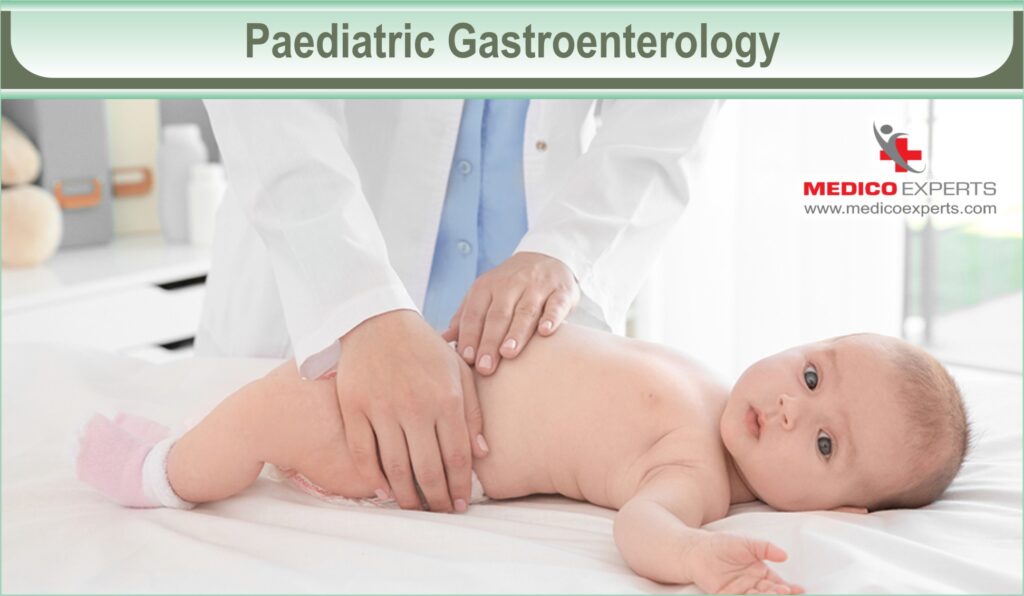
Paediatric gastroenterology is a medical specialty that focuses on the diagnosis and treatment of digestive disorders in children. Gastrointestinal (GI) disorders may affect various parts of the digestive system, including the esophagus, stomach, intestines, liver, and pancreas.
Some common conditions that paediatric gastroenterologists diagnose and treat include:
- Celiac disease: An autoimmune disorder triggered by the consumption of gluten, a protein found in wheat, barley, and rye, which damages the lining of the small intestine.
- Food allergies and intolerances: Children may develop allergies or intolerances to certain foods, such as milk, eggs, peanuts, or lactose.
- Chronic constipation and diarrhea: These conditions can significantly impact a child’s digestive health and quality of life.
- Hepatobiliary disorders: Paediatric gastroenterologists diagnose and manage liver and gallbladder diseases, including viral hepatitis.
4. Paediatric Nephrology:
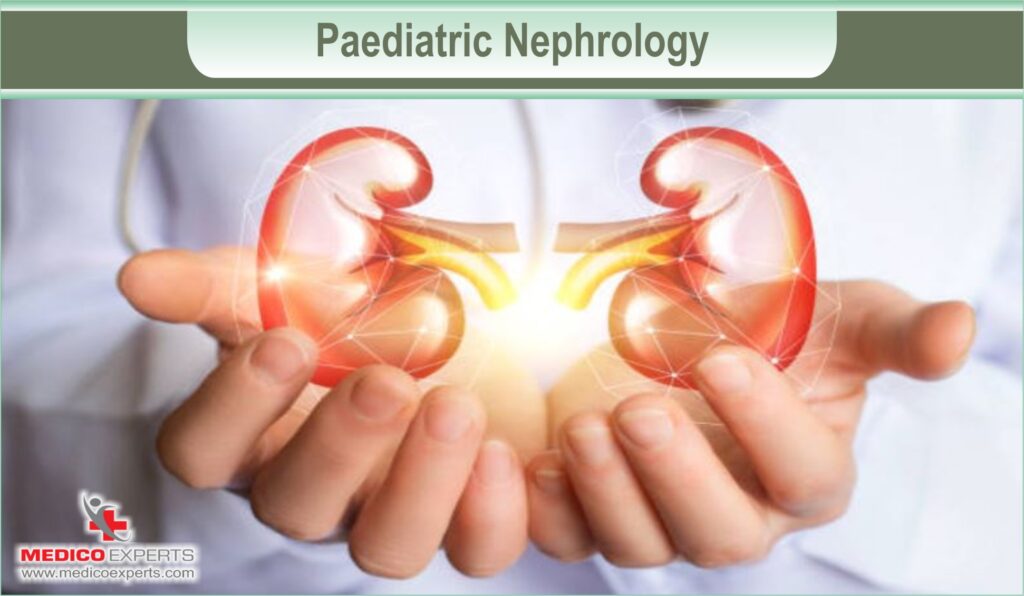
Paediatric nephrology is a medical subspecialty that focuses on the diagnosis, treatment, and management of kidney and urinary tract disorders in children and adolescents. Nephrologists who specialize in paediatric nephrology have expertise in managing various acute and chronic kidney conditions specific to the pediatric population.
Some common conditions that paediatric nephrologists diagnose and treat include:
- Congenital kidney abnormalities: Some children may be born with structural abnormalities in their kidneys or urinary tract, such as kidney malformations or urinary tract obstructions.
- Nephrotic syndrome: This is a kidney disorder characterized by excessive protein loss in the urine, leading to swelling, fluid retention, and increased risk of infections.
- Urinary tract infections: Paediatric nephrologists diagnose and manage urinary tract infections, which are common in children and can sometimes lead to complications if left untreated.
5. Paediatric Neurology:
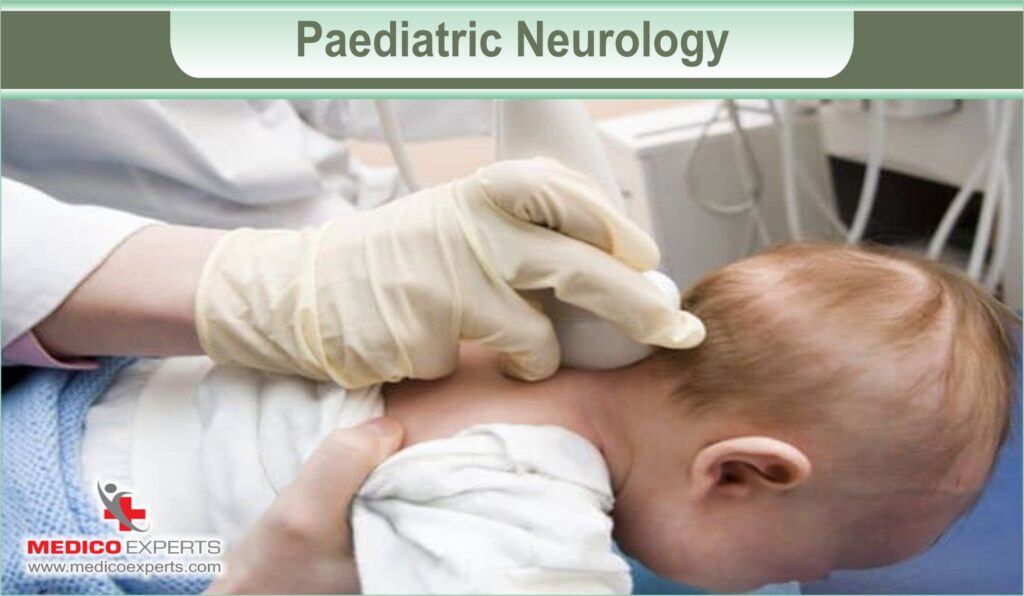
Paediatric neurology is a specialized branch of medicine that focuses on the diagnosis, treatment, and management of neurological conditions in children and neonates. Neurological disorders affect the brain, spinal cord, and nerves, and can have a significant impact on a child’s development and quality of life.
Some common conditions that paediatric neurologists diagnose and treat include:
1. Epilepsy: Paediatric neurologists play a crucial role in diagnosing and managing epilepsy, a neurological disorder characterized by recurrent seizures.
- Developmental delays and disorders: Neurologists assess and provide care for children with developmental delays, such as motor skills and speech delays, as well as developmental disorders, including autism spectrum disorder and attention deficit hyperactivity disorder (ADHD).
- Cerebral palsy: This is a group of disorders that affect movement and posture, often caused by brain damage during infancy or early childhood.
- Neuromuscular disorders: Paediatric neurologists diagnose and treat conditions that affect the muscles and nerves , such as muscular dystrophy, myasthenia gravis, and peripheral neuropathy.
6. Paediatric Oncology
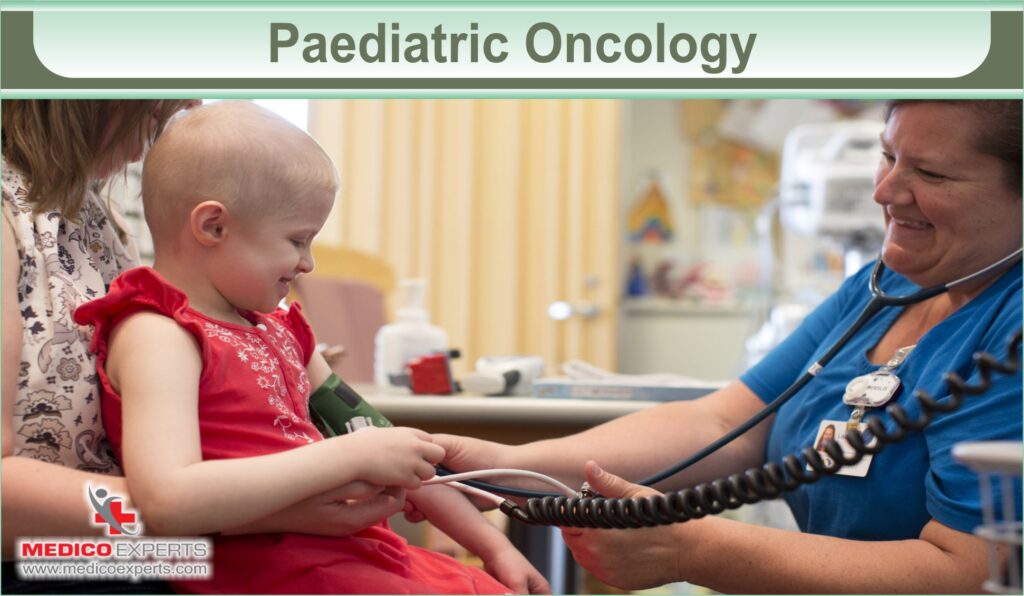
Paediatric oncology is a specialized field of medicine that focuses on the diagnosis, treatment, and management of cancer in children, neonates, and young adults. It involves a multidisciplinary approach, with paediatric oncologists working closely with other healthcare professionals, such as surgeons, radiation oncologists, pathologists, and nurses, to provide comprehensive care for young patients with cancer.
Here are some important points about paediatric oncology:
- Common types of childhood cancer: Paediatric oncologists diagnose and treat various types of cancer that can affect children, including leukemia (the most common childhood cancer), brain tumors, neuroblastoma, Wilms tumor (kidney cancer), sarcomas, lymphomas, and others.
- Specialized treatment approaches: Paediatric oncologists use different treatment modalities to manage childhood cancer, including chemotherapy, radiation therapy, surgery, targeted therapy, immunotherapy, and sometimes stem cell transplantation. The goal is to achieve the best possible outcome while minimizing the long-term effects of treatment on the child’s growth and development.
7. Paediatric plastic surgeon:
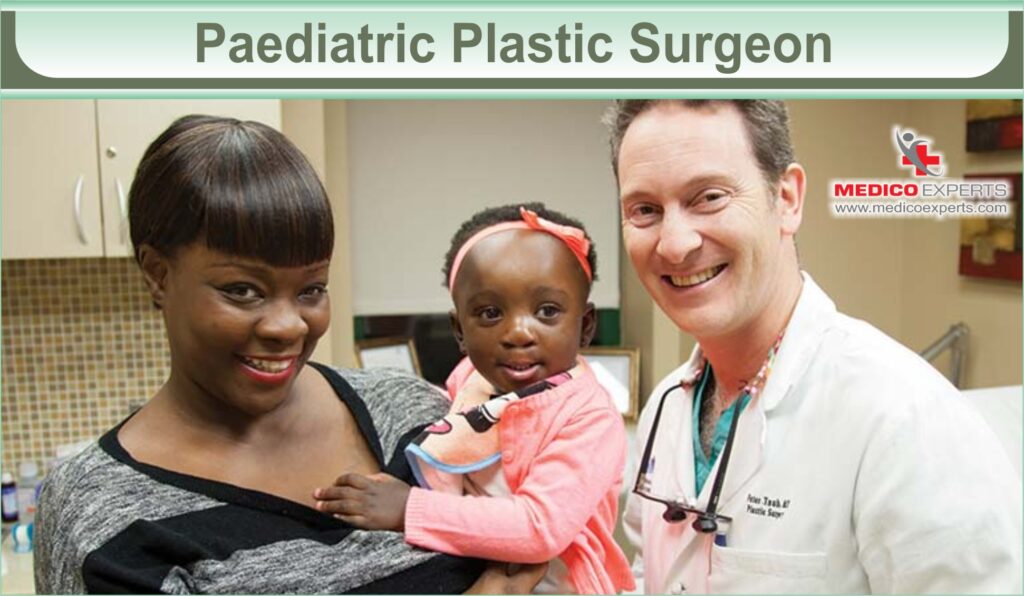
Paediatric plastic surgery is a specialized field of surgery that focuses on the diagnosis, treatment, and management of various congenital and acquired deformities in children. This branch of plastic surgery is specifically tailored to address the unique needs of pediatric patients, from infants to young adults.
Some key points about paediatric plastic surgery include:
- Reconstructive procedures: Paediatric plastic surgeons perform a wide range of reconstructive procedures to correct birth defects, developmental abnormalities, and traumatic injuries in children. These may include cleft lip and palate repair, craniofacial surgeries, hand and foot deformity corrections, burn reconstruction, and surgical treatment of vascular anomalies.
- Cosmetic procedures: While cosmetic surgery in children is less common and typically only performed for medical or psychological reasons, paediatric plastic surgeons may also address cosmetic concerns that significantly impact a child’s quality of life and well-being. This may include procedures such as correction of prominent ears or prominent facial features.
Conclusion
In conclusion, pediatric specialties play a vital role in providing specialized and comprehensive care to infants, children, adolescents, and young adults. Pediatricians who specialize in various fields such as cardiology, endocrinology, pulmonology, gastroenterology, neurology, oncology, nephrology possess the expertise to diagnose and treat specific medical conditions in young patients.
These specialized pediatricians work alongside other healthcare professionals, including social workers, psychologists, and surgeons, to ensure the best possible care and outcomes for children. By focusing on their specific area of expertise, pediatric specialists contribute to the overall well-being and future health of pediatric patients while addressing their unique healthcare needs.
FAQ :
Q1. What are the different pediatric groups?
The different pediatric groups are cardiology, oncology, gastroenterology, nephrology, neonatal care etc
Q2. What age is pediatric classification?
Pediatric specialists generally see newborns till young adults of 21 years.



